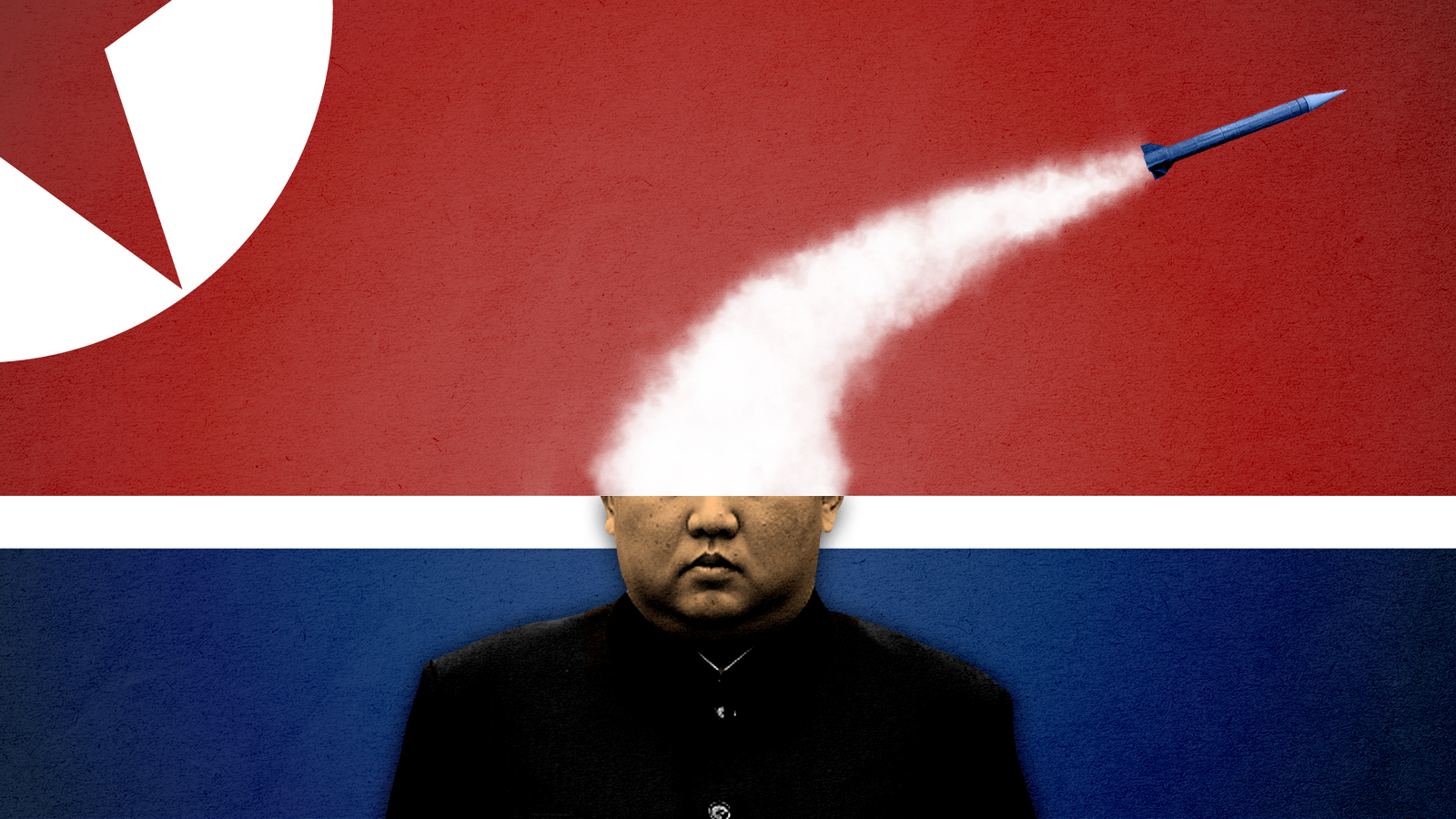The North Korean nuclear threat, explained
Why does Kim Jong Un need an atomic arsenal?

A free daily email with the biggest news stories of the day – and the best features from TheWeek.com
You are now subscribed
Your newsletter sign-up was successful
A nuclear menace continues to rear its head on the Korean peninsula. North Korea recently accused the United States of pushing the ongoing conflict with its rival South Korea to an "extreme red line" and vowed to counter with the "most overwhelming nuclear force." The statement from Pyongyang's Foreign Ministry came after U.S. Defense Secretary Lloyd Austin announced the U.S. would expand joint military drills with South Korea and deploy more military assets, including fighter jets and aircraft carriers. Pyongyang says these "hostile acts" threaten to turn the Korean Peninsula into a "huge war arsenal and a more critical war zone." The latest warning comes after Leader Kim Jong Un called for an "exponential increase" in his country's nuclear arsenal after reportedly conducting an unprecedented number of missile tests in 2022.
While North Korea has decried recent joint military exercises as a provocation, the White House reasserted it has no hostile intents. Will Kim continue to raise the nuclear threat level? And what can be done? Here's everything you need to know:
Why does North Korea want nukes?
Kim worries that his government will be overthrown by rivals like the U.S. and South Korea. Doug Bandow at Foreign Policy wrote that the North Korean leader's goal is "avoiding domination by another power" — and specifically to protect the country from America — and nuclear weapons are a hedge against that possibility. Indeed, the country's state media said last year's missile tests are a response to U.S. naval exercises near the Korean Peninsula, which Pyongyang considered an invasion rehearsal.
The Week
Escape your echo chamber. Get the facts behind the news, plus analysis from multiple perspectives.

Sign up for The Week's Free Newsletters
From our morning news briefing to a weekly Good News Newsletter, get the best of The Week delivered directly to your inbox.
From our morning news briefing to a weekly Good News Newsletter, get the best of The Week delivered directly to your inbox.
Even in an authoritarian regime, there are still political considerations. Kim's support of the nuclear program "is as much about bolstering his popularity as it is his security," Jean Mackenzie wrote for the BBC. The economy may be faltering, and its contacts with the world all but nonexistent, but "weapons are one area where Mr. Kim can show his people he is making progress."
How well-developed is the arsenal?
Recent estimates suggest North Korea possesses enough nuclear fuel for 50 weapons, The New York Times reported, and could produce a half-dozen or so weapons a year. Earlier this century, the country carried out a series of "increasingly sophisticated underground nuclear tests" — the last, in 2017, involved a device with an estimated explosive power of 50 to 300 kilotons. That's big: "A mere 100 kilotons would make the test six times as powerful as the bomb dropped on Hiroshima in 1945."
The country has also tested at least three ballistic missiles from what North Korean officials have described as a "nuclear-capable" rocket launching system. While the details of this system remain mostly unclear, the state-run Korean Central News Agency said it could potentially target any location in South Korea.
What do the missile tests tell us?
Nuclear weapons don't mean much without a means of delivering them to a target. That's what makes the country's recent missile tests so alarming. "Kim has fired off a record number of missiles this year to demonstrate his weapons advances," Bloomberg reported, a tally that also includes more than 80 solid-fuel ballistic missile launches since 2019, two hypersonic missile tests in the last two years, and the October launch of an intermediate-range rocket that flew over Japan. The country appears intent on showing it can hurt its rivals: A barrage of tests in September and October was designed to show North Korea can use tactical nuclear weapons to "wipe out" South Korean and U.S. targets, The Associated Press reported.
A free daily email with the biggest news stories of the day – and the best features from TheWeek.com
In total, The New York Times reported that North Korea fired more than 95 ballistic and other missiles during tests in 2022, more than any other year in its history. Military officials then started the new year with a bang — by firing another short-range missile that was reportedly 600mm in size, compared to the average warhead which is just 300mm. The Times also reported that the country is continuing with its development of intercontinental ballistic missiles (ICBMs) that have reportedly been undergoing research for years.
Does that mean North Korea has all the technology figured out?
Nobody really knows for certain. One major question is whether North Korea can fit nuclear warheads on those new missiles. Al Jazeera reported that a U.N. panel reported in 2021 that one assessment has concluded "that North Korea does indeed have the ability to mount nuclear warheads on its short, medium, and long-range ballistic missiles." There are other technical questions that outsiders don't know if North Korea has solved.
Is the U.S. actually in danger, then?
North Korea might possess the technical capability to attack America. A mid-November 2022 launch of an ICBM demonstrated the range to hit the U.S. mainland, NBC reported, although that would depend on the weight of any actual warhead fitted to the missile. However, one thing is clear: North Korea is certainly looking to develop weaponry with the capability of crossing the ocean.
The other question is whether North Korea would ever actually choose to attack the United States. There is some skepticism on that front. Yes, North Korea eventually wants to reunite with — and rule — America's ally, South Korea. But the University of Utah's Clint Work wrote in 2018 for The Washington Post that self-preservation is the key to Kim's decision-making: "North Korea won't attack the United States unless attacked first."
What happens now?
Despite calls for North Korea to return to "denuclearization" talks, the Foreign Ministry clarified that the door would remain closed if the U.S. and South Korea continue to expand their joint military actions. "The DPRK is not interested in any contact or dialogue with the U.S. as long as it pursues its hostile policy and confrontational line," said the ministry spokesperson in the statement, Bloomberg reported. "The more dangerous the U.S. threat to the DPRK gets, the stronger backfire the U.S. will face in direct proportion to it."
The Defense Ministry in Seoul said the U.S. and South Korea recently staged a joint air drill that included a B-1B strategic bomber and F-22 and F-35B stealth fighters, Reuters reports.
"The drills were to show U.S.'s will and capabilities to provide strong and credible extended deterrence against North Korea's nuclear and missile threats," the ministry said in a statement.
U.S. Defense Secretary Austin said the allies' joint exercises would continue.
Updated Feb. 3, 2023: This article has been updated with new information throughout.
Joel Mathis is a writer with 30 years of newspaper and online journalism experience. His work also regularly appears in National Geographic and The Kansas City Star. His awards include best online commentary at the Online News Association and (twice) at the City and Regional Magazine Association.
-
 The environmental cost of GLP-1s
The environmental cost of GLP-1sThe explainer Producing the drugs is a dirty process
-
 Greenland’s capital becomes ground zero for the country’s diplomatic straits
Greenland’s capital becomes ground zero for the country’s diplomatic straitsIN THE SPOTLIGHT A flurry of new consular activity in Nuuk shows how important Greenland has become to Europeans’ anxiety about American imperialism
-
 ‘This is something that happens all too often’
‘This is something that happens all too often’Instant Opinion Opinion, comment and editorials of the day
-
 Everything you need to know about King Charles' coronation
Everything you need to know about King Charles' coronationSpeed Read Buckingham Palace says King Charles' coronation will "reflect the monarch's role today and look towards the future"
-
 Returning the Crown Jewels
Returning the Crown JewelsSpeed Read The objects and gemstones are said to be of 'incalculable cultural, historical, and symbolic value'
-
 What's next for King Charles?
What's next for King Charles?Speed Read After 10 days of national mourning for the queen, the United Kingdom moves forward with a new monarch at the helm
-
 Inside the queen's funeral
Inside the queen's funeralSpeed Read A final goodbye to the beloved monarch who reigned for 70 years


